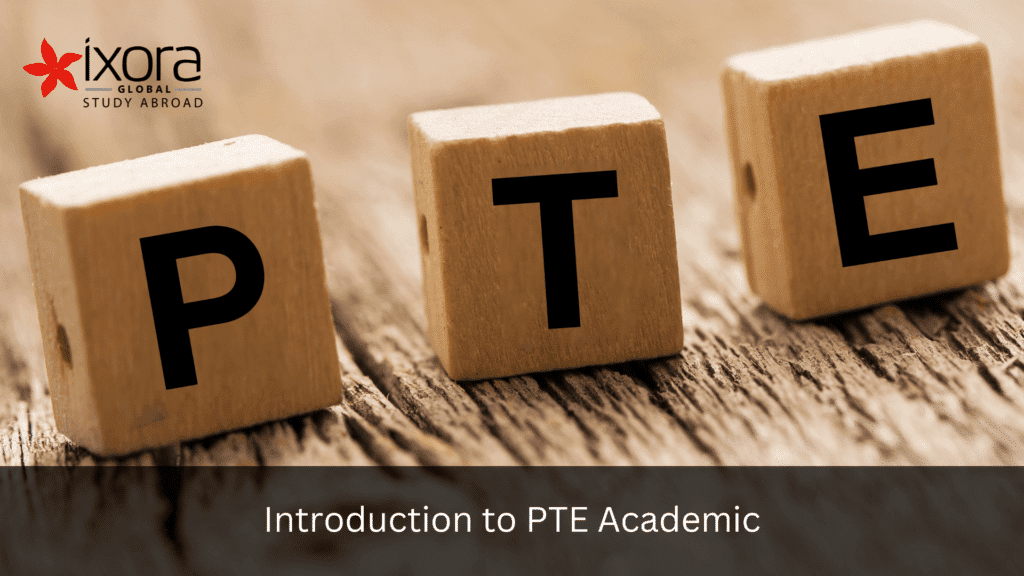Undergrad
Postgrad
Top 10 Strategies for Success

Mastering the PTE Academic Exam: Top 10 Strategies for Success
The Pearson Test of English (PTE) Exam represents a computer-based assessment of English language proficiency, evaluating the listening, reading, speaking, and writing abilities of non-native English speakers. Achieving a commendable score on the PTE Academic Exam holds paramount importance for individuals aspiring for university admissions, professional accreditation, or immigration purposes.
To facilitate your preparation and bolster your prospects of scoring well, we’ve curated a compilation of the top 10 strategies:
1. Grasp the Test Format
Before embarking on your preparation journey, it’s imperative to gain a comprehensive understanding of the PTE Exam’s format. Familiarize yourself with its various sections, the number of questions in each section, and the allotted time. This familiarity will enable you to strategize your time effectively during the exam and concentrate on areas requiring improvement.
2. Cultivate Effective Time Management Skills
Effective time management lies at the core of success in the PTE Exam. Practice answering questions within the specified time frame for each section. Hone your ability to pace yourself, giving precedence to questions you find more manageable or those carrying higher point values. This approach will aid in completing all questions within the allotted time and minimize the risk of leaving any unanswered.
3. Expand Your Lexicon
To excel in the PTE Exam, a diverse vocabulary is indispensable. Cultivate a routine of immersing yourself in English literature, newspapers, and magazines to encounter a plethora of lexical choices. Keep a record of unfamiliar words, understand their definitions, and employ them in relevant contexts. Moreover, integrate these newfound words into your writing and speaking exercises to bolster both your confidence and fluency.
4. Enhance Your Command of Grammar
A solid grasp of grammar is integral to achieving proficiency in language. Dedicate effort towards refining your grammar skills by comprehending and practicing various sentence structures, verb tenses, and parts of speech. Consistently revisit English grammar principles and consider utilizing reputable grammar references or online tutorials to target any particular areas of difficulty.
5. Hone Your Active Listening Skills
Success in the listening section of the PTE Exam hinges on sharp and engaged listening abilities. Train yourself to listen attentively for precise information, adeptly take notes, and discern the primary concepts conveyed in audio recordings. Familiarize yourself with diverse English accents to ensure ease in understanding various speakers. Make use of online resources and practice materials to refine and strengthen your listening proficiency.
6. Master Efficient Note-Taking Techniques
Efficient note-taking proves pivotal, particularly during the listening and reading segments of the assessment. Acquire shorthand methods, symbols, and abbreviations that expedite the capture of crucial information. Practice condensing key points while listening or reading, crafting succinct summaries. This skill not only aids during the exam but also enhances overall comprehension and retention capabilities.
7. Enhance Speaking Fluidity
Elevating fluency and pronunciation stands paramount for success in the speaking segment of the PTE Exam. Engage in regular English conversation, be it with a native speaker or via language exchange platforms. Attend to intonation, stress, and rhythm while speaking. Record your speech and identify areas necessitating improvement. You can also acquaint yourself with the question types in the speaking section and practice delivering responses within the designated time frame.
8. Accelerate Reading Velocity and Understanding
Efficient reading proficiency proves essential for the reading segment of the PTE Exam. Regularly engage with diverse textual materials, spanning articles, essays, and scholarly papers, to enhance reading speed. Master the techniques of skimming and scanning to swiftly locate key information while grasping main concepts and supporting details. Employ practice tests to replicate exam conditions, refining your ability to respond to questions within stipulated time limits.
9. Perfect Your Writing Proficiency
The writing tasks in the PTE Exam gauge your capacity to articulate ideas cohesively, arrange information logically, and employ appropriate grammar and vocabulary. Practice composing various essay types, reports, and summaries to bolster writing skills. Solicit feedback from educators, language specialists, or proficient speakers to pinpoint areas necessitating improvement, subsequently refining your writing approach.
10. Engage in Mock Examinations and Self-Assessment
Incorporate mock tests into your study routine to replicate the exam atmosphere and gauge your advancement. Scrutinize your performance, pinpointing your proficiencies and areas for development. Assess your scores across each section to pinpoint aspects necessitating further attention. Detect recurring errors and concentrate on rectifying them through focused practice and review sessions.
Securing a commendable score on the PTE Exam demands a comprehensive strategy that addresses all facets of English language proficiency. By adhering to these top 10 recommendations, familiarizing yourself with the test format, and committing significant time to practice, you can bolster your confidence and significantly enhance your prospects of achieving an outstanding score. Best wishes for your exam!
To facilitate your preparation and bolster your prospects of scoring well, we’ve curated a compilation of the top 10 strategies:
1. Grasp the Test Format
Before embarking on your preparation journey, it’s imperative to gain a comprehensive understanding of the PTE Exam’s format. Familiarize yourself with its various sections, the number of questions in each section, and the allotted time. This familiarity will enable you to strategize your time effectively during the exam and concentrate on areas requiring improvement.
2. Cultivate Effective Time Management Skills
Effective time management lies at the core of success in the PTE Exam. Practice answering questions within the specified time frame for each section. Hone your ability to pace yourself, giving precedence to questions you find more manageable or those carrying higher point values. This approach will aid in completing all questions within the allotted time and minimize the risk of leaving any unanswered.
3. Expand Your Lexicon
To excel in the PTE Exam, a diverse vocabulary is indispensable. Cultivate a routine of immersing yourself in English literature, newspapers, and magazines to encounter a plethora of lexical choices. Keep a record of unfamiliar words, understand their definitions, and employ them in relevant contexts. Moreover, integrate these newfound words into your writing and speaking exercises to bolster both your confidence and fluency.
4. Enhance Your Command of Grammar
A solid grasp of grammar is integral to achieving proficiency in language. Dedicate effort towards refining your grammar skills by comprehending and practicing various sentence structures, verb tenses, and parts of speech. Consistently revisit English grammar principles and consider utilizing reputable grammar references or online tutorials to target any particular areas of difficulty.
5. Hone Your Active Listening Skills
Success in the listening section of the PTE Exam hinges on sharp and engaged listening abilities. Train yourself to listen attentively for precise information, adeptly take notes, and discern the primary concepts conveyed in audio recordings. Familiarize yourself with diverse English accents to ensure ease in understanding various speakers. Make use of online resources and practice materials to refine and strengthen your listening proficiency.
6. Master Efficient Note-Taking Techniques
Efficient note-taking proves pivotal, particularly during the listening and reading segments of the assessment. Acquire shorthand methods, symbols, and abbreviations that expedite the capture of crucial information. Practice condensing key points while listening or reading, crafting succinct summaries. This skill not only aids during the exam but also enhances overall comprehension and retention capabilities.
7. Enhance Speaking Fluidity
Elevating fluency and pronunciation stands paramount for success in the speaking segment of the PTE Exam. Engage in regular English conversation, be it with a native speaker or via language exchange platforms. Attend to intonation, stress, and rhythm while speaking. Record your speech and identify areas necessitating improvement. You can also acquaint yourself with the question types in the speaking section and practice delivering responses within the designated time frame.
8. Accelerate Reading Velocity and Understanding
Efficient reading proficiency proves essential for the reading segment of the PTE Exam. Regularly engage with diverse textual materials, spanning articles, essays, and scholarly papers, to enhance reading speed. Master the techniques of skimming and scanning to swiftly locate key information while grasping main concepts and supporting details. Employ practice tests to replicate exam conditions, refining your ability to respond to questions within stipulated time limits.
9. Perfect Your Writing Proficiency
The writing tasks in the PTE Exam gauge your capacity to articulate ideas cohesively, arrange information logically, and employ appropriate grammar and vocabulary. Practice composing various essay types, reports, and summaries to bolster writing skills. Solicit feedback from educators, language specialists, or proficient speakers to pinpoint areas necessitating improvement, subsequently refining your writing approach.
10. Engage in Mock Examinations and Self-Assessment
Incorporate mock tests into your study routine to replicate the exam atmosphere and gauge your advancement. Scrutinize your performance, pinpointing your proficiencies and areas for development. Assess your scores across each section to pinpoint aspects necessitating further attention. Detect recurring errors and concentrate on rectifying them through focused practice and review sessions.
Securing a commendable score on the PTE Exam demands a comprehensive strategy that addresses all facets of English language proficiency. By adhering to these top 10 recommendations, familiarizing yourself with the test format, and committing significant time to practice, you can bolster your confidence and significantly enhance your prospects of achieving an outstanding score. Best wishes for your exam!
To know more about study-abroad ventures, let’s connect online through these platforms:
Instagram: https://www.instagram.com/ixoraglobal/
Facebook: https://www.facebook.com/globalixora
Twitter: https://twitter.com/ixora_global
If you want to study abroad, call or WhatsApp us at +919091011101.
You can also email us at contactus@ixorainternational.in
Check out our website http://www.ixorainternational.in & subscribe to our YouTube
Top 10 Strategies for Success Read More »









